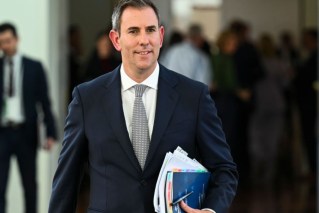Ask the Expert: Death, deeming and defined benefits – we answer three curly super questions


The new year is a great time to kickstart some new financial habits. Photo: TND
Question 1
- My partner cannot claim a part pension because I have helped my offspring with buying their houses by giving them more than the annual limit of $10,000 per year. Does this requirement from Centrelink expire in five years? Also, if further financial support is given in the form of a legal loan with interest, does this overcome the Centrelink problem?
The Centrelink deprivation rules are designed to ensure you use your assets to provide an income for yourself before asking the taxpayer to fund your retirement.
To re-cap, if you give away more than $10,000 in a financial year, or $30,000 over a five-year period, then Centrelink will apply the deprivation rules.
That is, they will still asset test the amount above these limits and deem them under the income test for the next five years.
So basically, for five years Centrelink will just assume you still hold the money, but after five years it’s no longer counted.
A loan is not caught under ‘deprivation’ rules as there is an expectation that the money will be repaid.
However, the outstanding value of a loan is still counted under the assets and income test as it is money owed to you. If you did decide to ‘forgive’ the loan, then it would be caught under the deprivation rules. So, there is no getting around it.
Before giving away or lending money just ensure you do not leave yourself short.
Question 2
- What are the pros and cons of a binding death benefit nomination versus a reversionary pension nomination? Is the reversionary one more restrictive in what the person receiving the pension can do with it?
Superannuation benefits generally don’t form part of your estate. That is, they are generally not dealt with via your will.
Instead, the super fund can pay the proceeds directly to your beneficiaries. However, if you do want your super proceeds to be dealt with via your will, and there are sometimes good reasons for this, you can nominate your ‘Legal Personal Representative’ to achieve this.
Super fund members commencing an account-based pension (income stream) have the following options for death benefit nominations:
- Automatic reversion nomination
- Binding death benefit nomination
- Preferred or no death benefit nomination (therefore leave it up to the trustee’s discretion).
Before we get into the pros and cons I’ll briefly explain what reversionary and binding nomination mean.
Reversionary Nomination
You can nominate a ‘reversionary pensioner’, normally restricted to your spouse, where your pension automatically ‘reverts’ to that person upon your death.
Binding Death Nomination
You can make a binding nomination on your pension account which, if valid, ‘binds’ the trustee to follow your nomination upon your death. The beneficiary could then take the proceeds in cash or have them paid via a pension, if the super fund allows (most do) and if you are eligible.
Advantages of a reversionary nomination:
- Provides certainty that the pension will continue after death with little interruption to regular pension payments
- After your death the beneficiary may have many decisions to make and going through grief, having this automated may be assistance to them and lower the risk of a rushed or inappropriate decisions being made at that time
- Even though the pension will continue, the beneficiary does have the option to cash out funds at any time as the funds will be ‘unrestricted non-preserved’
- Unlike many binding death nominations, reversionary nominations do not expire so no requirement to update/confirm
- For those will large balances, close to the transfer balance cap of $1.9 million (for 2023-24), the reversionary pension does not count against the beneficiary’s cap until 12 months after date of death. This allows them to adjust finances appropriately.
Advantages of a binding nomination:
- You can make a binding nomination if you want to give beneficiary the flexibility to decide whether they want to receive the death benefit as a lump sum or (where eligible) a pension
- The death benefit can be paid to your legal personal representative, i.e. you want the funds to be dealt with via your will
- You wish to nominate more than one beneficiary (i.e. some funds paid to your children). With a reversionary beneficiary nomination, the pension can only be continued by a single person
- You want the flexibility of updating your nomination at any time.
Your super fund will be able to provide you with further details on each of the options.
Question 3
- I am aged 59 and emigrated to Australia from the UK over 30 years ago but still have a Defined Benefits Scheme pension through my previous employer. Apparently I can now opt to take this as a lump sum which is worth approximately $280,000. Can I bring that money into my Australian Super Scheme here or as a lump sum and what tax implications would there be?
The UK changed its rules a number of years ago in relation to pension schemes.
One of the changes in relation to defined benefit pensions was that you must receive advice from a (UK) authorised independent adviser before transferring or cashing out their defined benefit. (An exception applies where the transfer value of the member’s benefits is less than £30,000).
Given the amount involved, this sounds like a good thing to do before deciding to cash it out. They can also provide information and advice on the UK tax implications.
A couple of websites to source a UK adviser are:
- Choosing a financial adviser | MoneyHelper
- Find the Top 20 Financial Advisers (IFAs) in your Area | Financial Advisers Near Me | unbiased.co.uk™
Next, if you do decide to redeem your defined benefit pension into a lump sum and transfer funds to Australia, then there will be some tax payable.
You can contribute the funds to super, within the normal non-concessional contributions caps.
This is a very complex area, and you should seek advice before proceeding so you can understand your personal tax implications both within the UK and Australia.
Craig Sankey is a licensed financial adviser and head of Technical Services & Advice Enablement at Industry Fund Services
Disclaimer: The responses provided are general in nature, and while they are prompted by the questions asked, they have been prepared without taking into consideration all your objectives, financial situation or needs.
Before relying on any of the information, please ensure that you consider the appropriateness of the information for your objectives, financial situation or needs. To the extent that it is permitted by law, no responsibility for errors or omissions is accepted by IFS and its representatives.
The New Daily is owned by Industry Super Holdings








